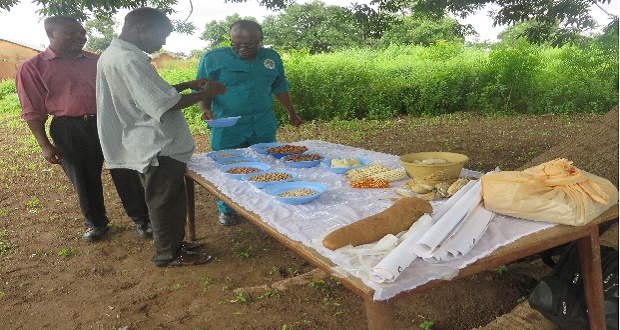The Northern Rural Growth Programme (NRGP) in collaboration with Nestle Ghana Limited is training small holder farmer groups on the cultivation of quality grains and cereals to meet international standards.
The trainers exploit the Community Adaptability Tool developed by the University of Ghana, interspersed with local drama performance as a means of educating the participants.
National Coordinator of the NRGP, Felix Darimaani at a similar exercise in the Gushie community of the Northern Region said the programme dubbed, “NRGP/Nestle quality grain management programme” was rolled out in 2011.
He clarified that it formed part of the NRGP and Nestles’ efforts aimed at facilitating small holder farmer groups’ access to competitive and remunerative markets for their farm produce.
This, according to Felix Darimaani, has since improved the expertise of the beneficiaries and MOFA staff on grain quality management using simple posters and Mycotoxin management guide.
He revealed that nearly 50,000 small holder farmer groups in seven districts within the NRGP’s operational zones comprising the three regions of the north and the Brong Ahafo region, have so far benefited from the programme.
He added that additional 1,125 agric extension officers and 158 aggregators of the Ministry of Food and Agriculture (MOFA), have been trained to complement the efforts of the District Value Chain Committees whose responsibility is to sustain the programme thereafter.
Felix Darimaani said Nestle had already secured 2,000 metric tons of quality millet and maize for their productivity.
Nestles’ Procurement Manager in charge of agriculture in the Central and West Africa operational zone, Klutse Kudomor, envisaged that full compliance with the programme could reduce aflatoxin and other dangerous substances found in locally produced cereals and grains and their health implications.
He noted with deep concern that the aflatoxin caused liver cancer and immune deficiency in children.
Klutse Kudomor reiterated Nestles’ belief in promoting nutrition, access to water and rural development.
He further reaffirmed the organization’s collaboration with the NRGP to achieve its objective of reducing the importation of quality cereals and grains for production.
Programme description
In view of the achievements of the Northern Rural Growth Programme, Nestle Ghana Limited expressed its willingness to purchase grains and cereals from the NRGP Programme area granted that the grains produced by local farmers will meet Nestles’ quality standards expectation.
With the programme area characterized by low humidity at harvest and low moisture content of grains at maturity, it provides a good environment for the production of good quality grain free from aflatoxin contamination.
The rationale for Nestles’ preference for produce from the NRGP is as a result of dry environment at harvest in the programme area which minimizes the risk of mould growth on the grain which pre-disposes produce aflatoxin contamination and its consequent adverse effect on human consumption, market price and productivity of livestock when contaminated produce is consumed.
For the NRGP, the grain quality management programme provides a good opportunity for its small holder farmers to have alternative market channels for their produce in addition to the other aggregators and marketers in the programme area.
The NRGP’s major priority is to provide a platform for mobilization of farmers and training of producers to ensure good quality grain fostering.
The ongoing training programme is one of the tailored series of training Nestle and the NRGP are collaboratively carrying out for its clients.
–
By: Abdul Karim Naatogmah/Citifmonline.com/Ghana




